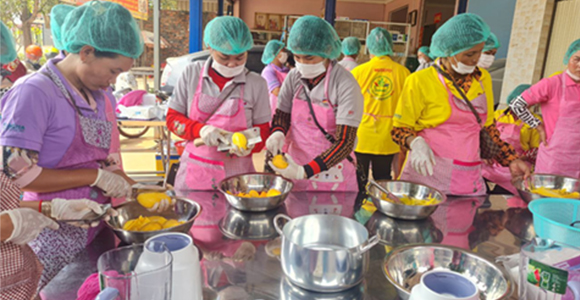The overall objective is to ensure climate-smart improvements in the food security and livelihood conditions of vulnerable households in Kampong Thom and Kampot provinces. To achieve this, RACHA will support female saving groups as well as startup initiatives like food banks in their production and sale of diversified, nutritious, and safe foods to consumers, especially families in ID poor categories 1 and 2 or families with pregnant women, lactating mothers and children under two years of age.
Description of Interventions: Support women of reproductive age and children vulnerable to food insecurity due to increased food and energy prices. The focus is on creating food banks and community-based business performance contracts (CBBPC), reducing food waste, and providing vulnerable populations access to healthy nutrition. Embed into the Saving for Change Groups approach, those startups that are to be showcased and the support saving groups, in general, will be continued and extended. The Foodbank project links the startups that process the excess agriculture products, the farmers who supply the excess agriculture products, and the Village Mobile Food Vendors who distribute the processed products to the mothers and children.
To date, the project has formed and built the capacity of 10 startup teams. Food Bank committees were also created. These committees decide what to produce based on the abundant food resources in the areas. They are now producing marketable products like mango leather, banana chips, mung bean and soybean milk, pumpkin juice, palm sap juices, cricket powder, yoghurt made from buffalo milk, mango and green mustard pickles, and cashew nut butter. They also produce wine, vinegar, jam, and syrup from cashew fruits/apples.
This micro-enterprise development merged into the saving groups' activities, including food banks, has enhanced economic empowerment at the grassroots level. This approach has boosted rural women's ability to improve their financial well-being and alleviate feminized poverty.

 : +855 23 213 724 | +855 23 726 257
: +855 23 213 724 | +855 23 726 257 : office@racha.org.kh
: office@racha.org.kh













